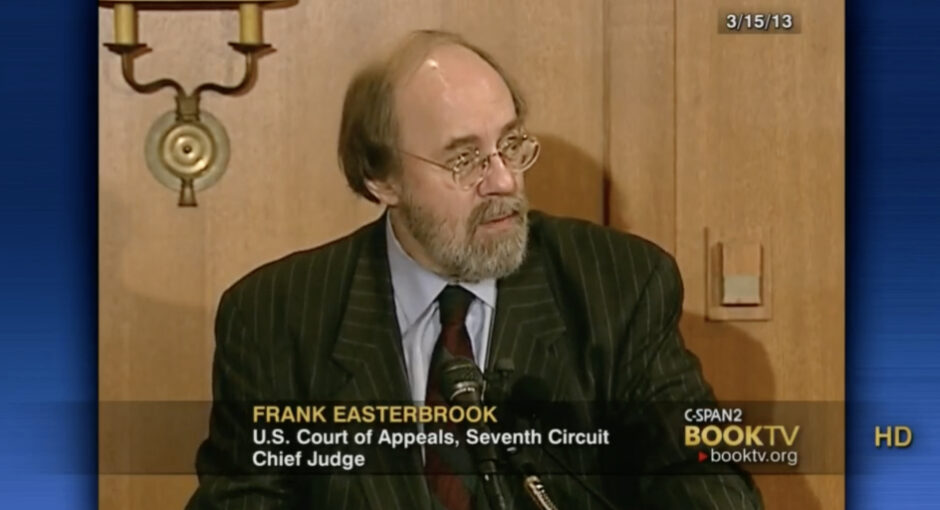A federal appeals court judge in Chicago expressed doubt during a hearing this morning that the court can review a lower court decision in drug manufacturer Eli Lilly’s 340B contract pharmacy lawsuit.
Judge Frank Easterbrook, the senior judge on the three-judge panel assigned to the case, gave lawyers for Lilly and the federal government 14 days to submit supplemental memos on whether the appeals court has jurisdiction to consider Lilly and the government’s separate legal challenges to U.S. Senior Judge Sarah Evans Barker’s October 2021 decision in Lilly case.
During today’s hearing, Easterbrook asked multiple questions about how the 340B administrative dispute resolution (ADR) process figures in the lawsuit.
Lilly challenges the legality of the May 2021 340B program violation letter it got from the U.S. Health Resources and Services Administration. Its lawsuit also challenges the legality of HRSA’s 340B ADR final rule.
In March 2021, Barker enjoined HRSA from implementing or enforcing the ADR rule against Lilly. The injunction remains in place. In her October 2021 decision, Barker said she would address Lilly and the government’s cross motions for judgements in their favor regarding the ADR rule’s legality “in due course.” That hasn’t happened yet.
In November 2021, HRSA sent the White House Office of Management and Budget a proposed replacement for its ADR rule. It said the replacement “better reflects the current state of the 340B program, and seeks to correct procedural deficiencies in the 340B ADR process.” The proposed new rule has been stuck at OMB ever since. OMB and HRSA have declined to say why.
A three-member HRSA ADR review panel in August dismissed the National Association of Community Health Centers’ ADR petitions against Astra Zeneca and Sanofi over those companies’ denials of 340B pricing involving the contract pharmacy program. The panel said it was precluded from ruling on NACHC’s claims against AstraZeneca and Sanofi because the U.S. Third Circuit Court of Appeals is considering the companies’ lawsuits challenging HRSA’s findings that their contract pharmacy restrictions violate the 340B statute.
NACHC’s companion ADR petition against Lilly was the subject of Barker’s injunction.
Lilly in November 2021 appealed Barker’s decision upholding HRSA’s conclusion that Lilly’s contract pharmacy policy broke the law. (Barker struck down and vacated HRSA’s violation letter to Lilly on the grounds it was arbitrary and capricious. HRSA appealed that part of Barker’s ruling.)
On April 7, a three-judge panel of the Seventh Circuit Court that included Easterbrook ordered Barker “to enter a judgment that fully and completely implements its decision, declaring specifically and separately the respective rights of the parties.” Barker seven days later entered an amended partial final judgement. Like her October 2021 decision, it did not address Lilly’s claims against the 340B ADR final rule.
Barker’s omission could knock the case off the rails.
In an order from the bench, Easterbrook directed the two sides to submit memos within two weeks addressing:
- whether Barker was right to separate Lilly’s claims against HRSA’s enforcement letter from Lilly’s claims against HRSA’s ADR final rule, and if her decision to do so created a jurisdictional barrier for the Seventh Circuit Court
- whether HRSA’s enforcement letter to Lilly is a final agency decision that can be challenged in court
- whether the U.S. Supreme Court’s 2016 decision in United States Army Corps of Engineers v. Hawkes has any bearing on Lilly’s case (the Hawkes case was about determining when a federal agency action is final within the meaning of the Administrative Procedure Act)
- the potential bearing of Health and Hospital Corporation of Marion County, Ind., v. Talevski, a case being argued before the Supreme Court next week Tuesday (the case involves whether individuals have a third-party right to sue public institutions for violations of congressional spending bills).
Easterbrook did not elaborate on why he wants additional briefing on the Tavelski case. In 2011, the Supreme Court ruled in Astra USA v. Santa Clara that 340B covered entities had no right as third-party beneficiaries of 340B pharmaceutical agreements to sue drug manufacturers for alleged charges above statutory 340B ceiling prices.
Easterbrook has a reputation for being brusque with lawyers who argue cases before him.
“Well respectfully, Judge Easterbrook …” Lilly attorney John O’Quinn began saying to the judge in response to a point that Easterbrook has just made.
“I wish you would stop saying respectfully,” Easterbrook cut him off. “It sounds like, ‘If you weren’t a judge, I’d like to punch you in the nose right now.’ Answer the question.”
Nominated to serve on the U.S. Seventh Circuit Court of Appeals by President Reagan, Easterbrook was its chief judge from 2006 to 2013.
Judge Amy St. Eve, a Trump nominee, asked both O’Quinn and U.S. Justice Department lawyer Alisa Klein how courts should determine whether a manufacturer’s offer of 340B pricing to a covered entity is bona fide—a central focus of last week’s appeals court hearing in Washington, D.C., in Novartis and United Therapeutics’ consolidated 340B contract pharmacy cases.
Judge John Lee, a Biden nominee, asked O’Quinn, “If you are basically asking us to read in or write in another term in the statute, why isn’t that something you should ask Congress to do? After all, when Congress wrote the statute, it wrote it rather broadly. Industry has changed, right? And so, you’re saying because the industry and the circumstances of the world have changed, the statute doesn’t quite address all the different permutations of relationships and the new issues that have arisen. That seems to me like the archetypical example of people going back to Congress and saying that Congress has to amend the statute, rather than having us as judges sit here and read something into the statute that isn’t there, at least not plainly.”


